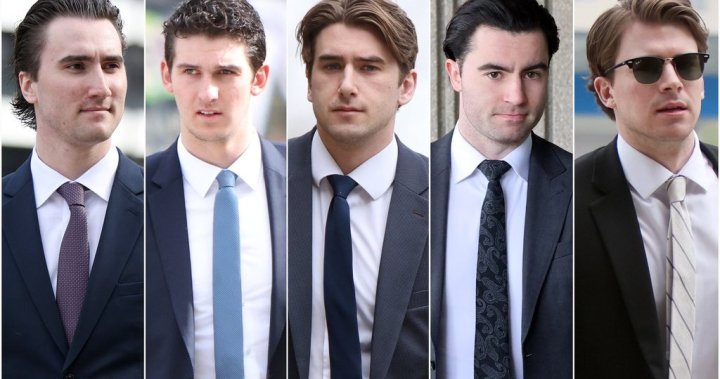As Toronto’s high-profile junior hockey sexual assault trial approaches its conclusion, the city finds itself once again grappling with uncomfortable questions about sports culture, accountability, and justice. After weeks of testimony, final arguments are set to begin on June 13th, bringing this closely watched case one step closer to resolution.
The trial involves five former members of Canada’s 2018 world junior hockey team charged with sexual assault stemming from an alleged incident following a Hockey Canada gala in London, Ontario. The proceedings have unfolded under intense public scrutiny, highlighting tensions between Canada’s beloved hockey culture and concerns about player conduct off the ice.
“This case has forced many Torontonians to confront difficult conversations about consent, accountability, and the privilege sometimes afforded to young athletes,” says Karyn Mitchell, director at Toronto’s Sexual Assault Support Centre. “Regardless of the verdict, the impact on our community’s perception of junior hockey has been substantial.”
Throughout the trial, the court has heard testimony detailing events at a London hotel following the Hockey Canada event. The prosecution and defense have presented starkly different interpretations of what occurred that night, with consent remaining the central point of contention.
Legal experts have noted the case’s complexity. “Sexual assault trials inherently involve nuanced questions about consent that juries must carefully evaluate,” explains Toronto-based criminal attorney Samantha Prentice. “The high-profile nature of this case adds another layer of complexity, as these young men carried the expectations and admiration of an entire country.”
The case has rippled through Toronto’s sports community, prompting discussions about the culture surrounding elite junior hockey programs. Local youth hockey organizations report implementing enhanced player education programs focusing on consent, respect, and responsible conduct.
“We’ve significantly expanded our character development curriculum,” says Marcus Williams, director of a prominent GTA youth hockey program. “This case has been a painful but necessary catalyst for change. We’re making sure our players understand that their conduct off the ice matters just as much as their performance on it.”
Hockey Canada has undergone substantial organizational changes since the allegations first surfaced, implementing new leadership and policies. The organization faced intense criticism for its initial handling of the situation, including revelations about settlement funds for sexual misconduct claims.
As the trial moves toward conclusion, Torontonians appear divided in their reactions. Some express concern about rushing to judgment before the court reaches its verdict, while others believe the case represents a long-overdue reckoning within hockey culture.
The timing coincides with a broader national conversation about accountability in sports. Several Toronto-based sports psychologists have noted the case’s potential long-term impact on junior hockey culture.
“These proceedings may mark a turning point,” notes Dr. Elaine Kumar, sports psychologist at the University of Toronto. “Beyond the verdict itself, this case has already forced organizations to reconsider how they prepare young athletes for the responsibilities that come with their elevated status in Canadian society.”
Whatever the outcome, this case has undeniably changed how many Torontonians view junior hockey, a sport deeply woven into our national identity. The final arguments beginning June 13th represent more than just legal proceedings—they symbolize a community wrestling with difficult questions about values, accountability, and the true meaning of sportsmanship in Canadian culture.







